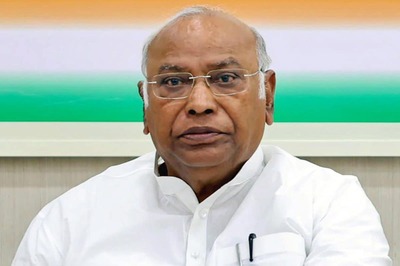
views
Riyadh: Women in Saudi Arabia will not need a male guardian's approval to run or vote in municipal elections in 2015, when women will also run for office for the first time, a Saudi official said on Wednesday.
The change signifies a step forward in easing the kingdom's restrictions against women, but it falls far short of what some Saudi reformers are calling for.
Shura Council member Fahad al-Anzi was quoted in the state-run al-Watan newspaper saying that approval for women to run and vote came from the guardian of Islam's holiest sites, the Saudi king, and therefore women will not need a male guardian's approval. The country's Shura Council is an all-male consultative body with no legislative powers.
Despite the historic decision by the king to allow women the right to participate in the country's only open elections, male guardian laws in Saudi Arabia remain largely unchanged. Women cannot travel, work, study abroad, marry, get divorced or gain admittance to a public hospital without permission from a male guardian.
The country is guided by an ultraconservative interpretation of Islam called Wahhabism.
Hatoun al-Fasi, a women's history professor in Riyadh, said just the announcement that Saudi women can run for office and vote without permission will stir debate.
"It's being brought up out of the blue and could open doors to discussions that we have enough of already," al-Fasi said.
While King Abdullah has pushed for some changes on women's rights, he has been cautious not to push too hard against ultraconservative clerics, who have in the past challenged social reforms. Saudi's ruling family draws its legitimacy from the backing of the kingdom's religious establishment.
The male guardianship laws are particularly stifling for women, Saudi female activist Wajeha al-Hawidar said.
"These laws make the woman like a child in all aspects of her life. She is not dealt with as an adult with a fully developed brain," al-Hawidar said.
The restrictions are practically all-encompassing.
Saudi women cannot study abroad unless a male guardian approves and accompanies them throughout their studies. Government-run hospitals are allowed to perform surgery on women only with approval from a male guardian, except in emergencies. Male guardians in Saudi Arabia are allowed to remove their daughters or sisters from school at any time. In the case that a father, uncle or brother is not available, mothers turn to their sons for approval to work or travel.
"Male guardianship laws are a problem that the Saudi woman has been dealing with for years. It's our number one demand that these laws be revoked," al-Fasi said. "It goes against the social rights that Islam gives women."
Al-Fasi and other Saudi women have been pushing the Saudi government for social reforms and greater rights for women, including to allow women the right to drive and for the dissolution of male guardianship laws. Saudi women have staged protests defying the ban.
Al-Hawidar said Wednesday's announcement means another barrier for women in Saudi Arabia has been lifted. However, she said the government might not see it through, because of expected resistance by those opposing such reforms.
"There are people in the government willing to listen reasonably, but people in society are not," al-Hawidar said. "They will hate you just for being different, and with these people there is no common language."




















Comments
0 comment